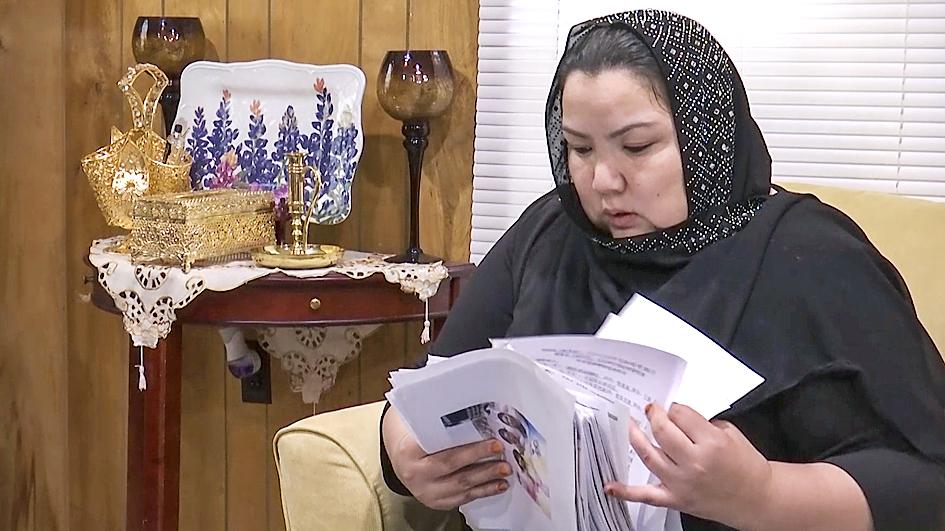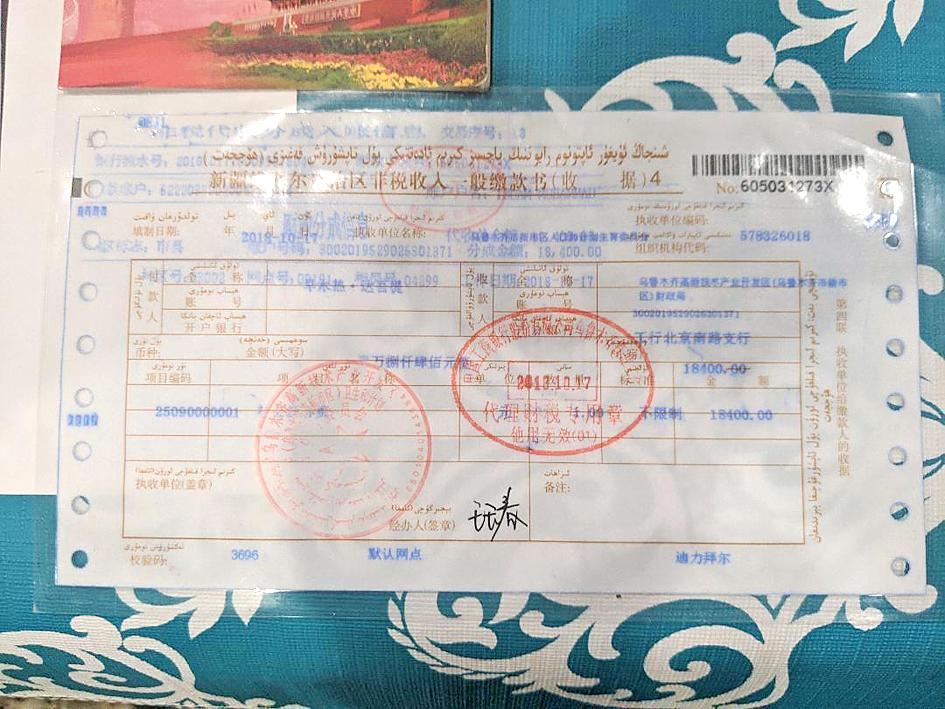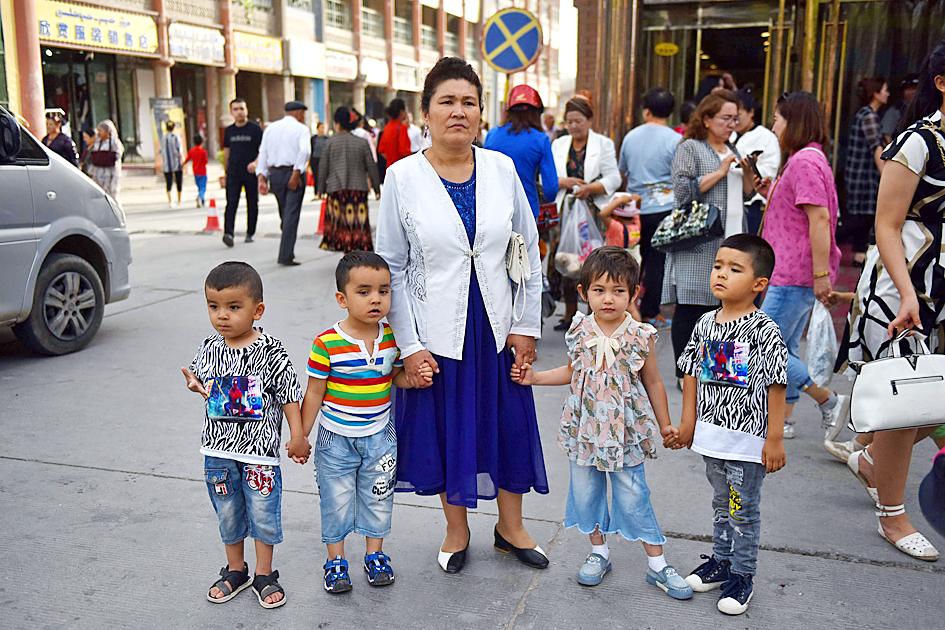The Chinese government is taking draconian measures to slash birth rates among Uighurs and other minorities as part of a sweeping campaign to curb its Muslim population, even as it encourages some of the country’s Han majority to have more children.
While individual women have spoken out before about forced birth control, the practice is far more widespread and systematic than previously known, according to an Associated Press (AP) investigation based on government statistics, state documents and interviews with 30 ex-detainees, family members and a former detention camp instructor.
The campaign over the past four years in Xinjiang is leading to what some experts are calling a form of “demographic genocide.”

Photo: AP
The state regularly subjects minority women to pregnancy checks, and forces intrauterine devices (IUDs), sterilization and even abortion on hundreds of thousands, the interviews and data show.
Even while the use of IUDs and sterilization has fallen nationwide, it is rising sharply in Xinjiang.
The population control measures are backed by mass detention both as a threat and as a punishment for failure to comply. Having too many children is a major reason people are sent to detention camps, the AP found, with the parents of three or more ripped away from their families unless they can pay huge fines.

Photo: AP / courtesy of Zumret Dawut
After Gulnar Omirzakh, a Chinese-born Kazakh, had her third child, the government ordered her to get an IUD inserted. Two years later, in January 2018, four officials in military camouflage came knocking at her door anyway.
They gave Omirzakh, the penniless wife of a detained vegetable trader, three days to pay a US$2,685 fine for having more than two children.
If she did not, they said, she would join her husband and a million other ethnic minorities locked up in internment camps — often for having too many children.

Photo: AFP
“To prevent people from having children is wrong,” said Omirzakh, who went deep in debt to scrape together the money and later fled to Kazakhstan. “They want to destroy us as a people.”
Birth rates in the mostly Uighur regions of Hotan and Kashgar plunged by more than 60 percent from 2015 to 2018, the latest year available in government statistics.
The hundreds of millions of dollars the government pours into birth control have transformed Xinjiang from one of China’s fastest-growing regions into one of its slowest in just a few years, according to new research obtained by AP in advance of publication by German anthropologist Adrian Zenz, a China scholar known for his studies on Xinjiang re-education camps.
“This is part of a wider control campaign to subjugate the Uighurs,” said Zenz, an independent contractor with the nonprofit Victims of Communism Memorial Foundation in Washington.
The Chinese Ministry of Foreign Affairs and the Xinjiang government did not respond to multiple requests for comment.
However, Beijing has said in the past that the new measures are merely meant to be fair, allowing both Han Chinese and ethnic minorities the same number of children.
Under China’s now-abandoned “one child” policy, the authorities had long encouraged, sometimes forced, contraceptives, sterilizations and abortions on Han Chinese, but minorities were allowed two children — three if they came from the countryside.
That changed under Chinese President Xi Jinping (習近平). Soon after he came to power, the government revised birth regulations so Xinjiang’s Han Chinese could have two or three children, just like minorities.
While equal on paper, in practice Han Chinese are largely spared the abortions, sterilizations, IUD insertions and detentions for having too many children that are forced on Xinjiang’s other ethnicities, interviews and data show.
Some rural Muslims, like Omirzakh, were punished even for having the three children allowed by the law.
Fifteen Uighurs and Kazakhs told reporters they knew people interned or jailed for having too many children. Many received years, even decades in prison.
Once in the detention camps, women are subjected to forced IUDs and what appear to be pregnancy prevention shots, interviews and data show.
One former detainee, Tursunay Ziyawudun, said she was injected until she stopped having her period and kicked repeatedly in the lower stomach during interrogations.
She now cannot have children and often doubles over in pain, bleeding from her womb, she said.
Ziyawudun said women at her camp were made to undergo gynecology exams and get IUDs, and their “teacher” told them they would face abortions if found pregnant.
In 2014, just over 200,000 IUDs were inserted in Xinjiang. By 2018, that jumped more than 60 percent to nearly 330,000 IUDs.
At the same time, IUD use fell sharply elsewhere in China, as many women began getting the devices removed.
Chinese health statistics also show a sterilization boom in Xinjiang.
Budget documents obtained by Zenz show that starting in 2016, the Xinjiang government began pumping tens of millions of dollars into a birth control surgery program.
Even while sterilization rates plummeted in the rest of the country, they surged seven-fold in Xinjiang from 2016 to 2018, to more than 60,000 procedures.
Zumret Dawut, a Uighur mother of three, said after her release from a camp in 2018, authorities forced her to get sterilized. If she did not, they told her she would be sent back to the camp.
“I was so angry,” she said. “I wanted another son.”
The birth control campaign is fueled by government worries that high birth rates among Muslims leads to poverty and extremism in Xinjiang. Although the program adopts tactics from China’s “one child” policy, the campaign unfolding in Xinjiang differs in that it is ethnically targeted.
“The intention may not be to fully eliminate the Uighur population, but it will sharply diminish their vitality, making them easier to assimilate,” said Darren Byler, an expert on Uighurs at the University of Colorado.
Some experts take it a step further.
“It’s genocide, full stop,” said Uighur expert Joanne Smith Finley, who works at Newcastle University in the UK “It’s not immediate, shocking, mass-killing on the spot type genocide, but it’s slow, painful, creeping genocide.”

NATIONAL SECURITY THREAT: An official said that Guan Guan’s comments had gone beyond the threshold of free speech, as she advocated for the destruction of the ROC China-born media influencer Guan Guan’s (關關) residency permit has been revoked for repeatedly posting pro-China content that threatens national security, the National Immigration Agency said yesterday. Guan Guan has said many controversial things in her videos posted to Douyin (抖音), including “the red flag will soon be painted all over Taiwan” and “Taiwan is an inseparable part of China,” while expressing hope for expedited “reunification.” The agency received multiple reports alleging that Guan Guan had advocated for armed reunification last year. After investigating, the agency last month issued a notice requiring her to appear and account for her actions. Guan Guan appeared as required,

A strong cold air mass is expected to arrive tonight, bringing a change in weather and a drop in temperature, the Central Weather Administration (CWA) said. The coldest time would be early on Thursday morning, with temperatures in some areas dipping as low as 8°C, it said. Daytime highs yesterday were 22°C to 24°C in northern and eastern Taiwan, and about 25°C to 28°C in the central and southern regions, it said. However, nighttime lows would dip to about 15°C to 16°C in central and northern Taiwan as well as the northeast, and 17°C to 19°C elsewhere, it said. Tropical Storm Nokaen, currently

PAPERS, PLEASE: The gang exploited the high value of the passports, selling them at inflated prices to Chinese buyers, who would treat them as ‘invisibility cloaks’ The Yilan District Court has handed four members of a syndicate prison terms ranging from one year and two months to two years and two months for their involvement in a scheme to purchase Taiwanese passports and resell them abroad at a massive markup. A Chinese human smuggling syndicate purchased Taiwanese passports through local criminal networks, exploiting the passports’ visa-free travel privileges to turn a profit of more than 20 times the original price, the court said. Such criminal organizations enable people to impersonate Taiwanese when entering and exiting Taiwan and other countries, undermining social order and the credibility of the nation’s

‘NATO-PLUS’: ‘Our strategic partners in the Indo-Pacific are facing increasing aggression by the Chinese Communist Party,’ US Representative Rob Wittman said The US House of Representatives on Monday released its version of the Consolidated Appropriations Act, which includes US$1.15 billion to support security cooperation with Taiwan. The omnibus act, covering US$1.2 trillion of spending, allocates US$1 billion for the Taiwan Security Cooperation Initiative, as well as US$150 million for the replacement of defense articles and reimbursement of defense services provided to Taiwan. The fund allocations were based on the US National Defense Authorization Act for fiscal 2026 that was passed by the US Congress last month and authorized up to US$1 billion to the US Defense Security Cooperation Agency in support of the